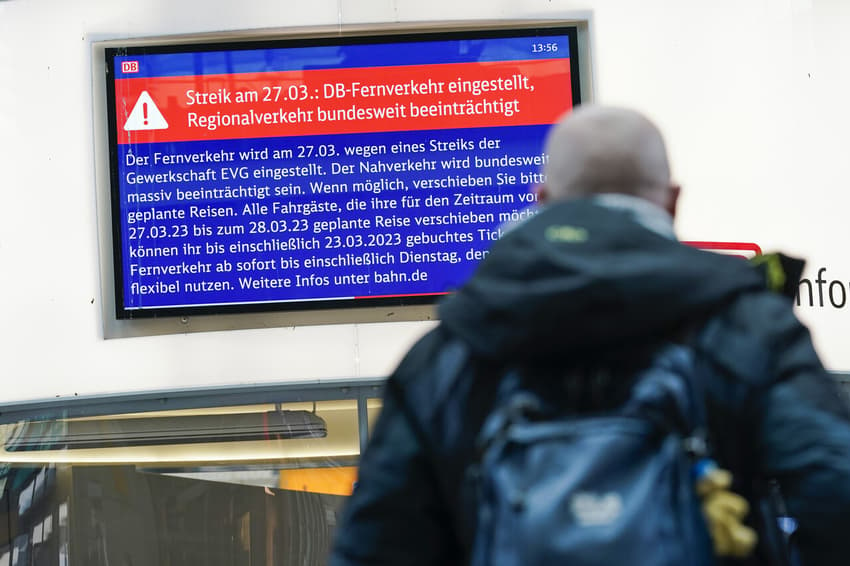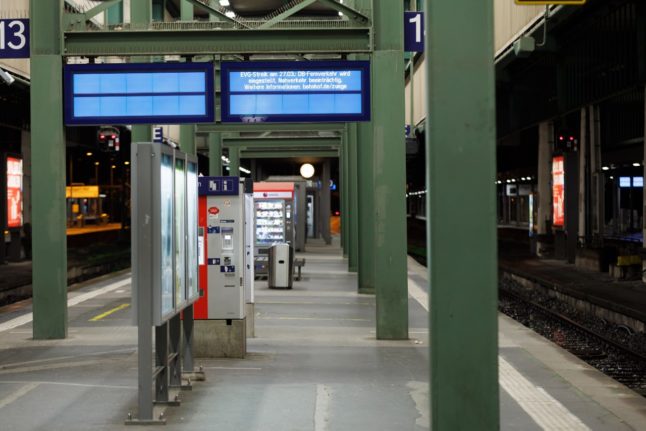Reader Question: Can workers in Germany stay home during transport strikes?

With rail transport at a standstill across Germany on Monday, many workers will be wondering what they can do if they can't make it into work.
Over the past few months, Germany has been hit by what seems like a never-ending wave of public sector strikes. On Monday, the industrial action ramped up, as rail workers' union EVG and Verdi workers joined forces in a combined 'mega strike', paralysing much of the country's rail network, as well as some bus routes, trams and air traffic.
Those with a long commute may have been left wondering how they'd be able to get to work - if at all. But would German employers see that as a valid reason to stay home? Here's what you need to know.
Can I stay at home if there is a strike?
In general, employees in Germany bear the so-called "travel risk", which means that even if there is a strike, it's their responsibility to be at work on time.
READ ALSO: Strikes: Do parents in Germany receive a day off work when Kitas close?
However, as many employers are now more flexible regarding working from home following the pandemic, it may be possible to work from home if you discuss the situation with your employer in beforehand.
If the strike is announced in advance - as with Monday's strike - you have to ask them about this in advance. If there is a spontaneous strike, you should contact your employer as soon as possible. If you simply show up late without an excuse or don't go to work, you could be given a warning.
What rules apply in the event of announced strikes?
When strikes are announced in advance, employees have to do everything they can reasonably be expected to do in order to be at work on time.
For strike days, this means getting up earlier, travelling by car or bicycle, carpooling, and planning for traffic jams and detours in advance. If this results in higher costs than on a "normal" workday - for example, for petrol or taxi fare - that is still employee's responsibility.
READ ALSO: EXPLAINED: What to expect during Monday's 'mega strike' in Germany
Only in exceptional circumstances can the extra expense or travel time be considered unreasonable: if, for example, people with low incomes have to take long and expensive cab rides to work, it might be okay not to drive to work on strike days.
What rules apply in the event of spontaneous strikes?
Even if there is a spontaneous strike, employees have to make an effort to be at work on time. However, the requirements are not quite as strict and being issued a warning by an employer for showing up late could be considered disproportionate.
Do employees have a right to work from home?
Since the pandemic, working from home has become much more common - but that doesn't mean that employees have an automatic right to steer clear of the office.
Nevertheless, if your employers allows it - and you're able to carry out work from home - this could be a good option on strike days.

An empty train station in Stuttgart on the day of a strike. Photo: picture alliance/dpa | Julian Rettig
Do employees get paid if they are late because of strikes?
No. The general rule is that you don't get paid for the time you don't work as an employee. The exceptions to this rule are sick days and holiday leave and the odd personal occasion such as a wedding or funeral in the immediate family.
However, since a strike affects many other people, it can't be considered a "personal" reason, so the principle of "no work, no pay" still applies on strike days.
Do children have to go to school when buses and trains are on strike?
Even when buses and trains are on strike, compulsory education generally goes ahead and students are expected to show up to school.
On Monday, however, some federal states have introduced special rules.
For example, in Bavaria, Baden-Württemberg, Rhineland-Palatinate and Mecklenburg-Western Pomerania, students can avoid face-to-face classes if they have no alternative means of travel, though they have to inform the school first thing in the morning.
In North Rhine-Westphalia school administrators are supposed to "act with a sense of proportion" if it becomes virtually impossible for students to get to school.
Pupils in Brandenburg can be exempted from compulsory attendance if they have to travel by bus or train.
Comments
See Also
Over the past few months, Germany has been hit by what seems like a never-ending wave of public sector strikes. On Monday, the industrial action ramped up, as rail workers' union EVG and Verdi workers joined forces in a combined 'mega strike', paralysing much of the country's rail network, as well as some bus routes, trams and air traffic.
Those with a long commute may have been left wondering how they'd be able to get to work - if at all. But would German employers see that as a valid reason to stay home? Here's what you need to know.
Can I stay at home if there is a strike?
In general, employees in Germany bear the so-called "travel risk", which means that even if there is a strike, it's their responsibility to be at work on time.
READ ALSO: Strikes: Do parents in Germany receive a day off work when Kitas close?
However, as many employers are now more flexible regarding working from home following the pandemic, it may be possible to work from home if you discuss the situation with your employer in beforehand.
If the strike is announced in advance - as with Monday's strike - you have to ask them about this in advance. If there is a spontaneous strike, you should contact your employer as soon as possible. If you simply show up late without an excuse or don't go to work, you could be given a warning.
What rules apply in the event of announced strikes?
When strikes are announced in advance, employees have to do everything they can reasonably be expected to do in order to be at work on time.
For strike days, this means getting up earlier, travelling by car or bicycle, carpooling, and planning for traffic jams and detours in advance. If this results in higher costs than on a "normal" workday - for example, for petrol or taxi fare - that is still employee's responsibility.
READ ALSO: EXPLAINED: What to expect during Monday's 'mega strike' in Germany
Only in exceptional circumstances can the extra expense or travel time be considered unreasonable: if, for example, people with low incomes have to take long and expensive cab rides to work, it might be okay not to drive to work on strike days.
What rules apply in the event of spontaneous strikes?
Even if there is a spontaneous strike, employees have to make an effort to be at work on time. However, the requirements are not quite as strict and being issued a warning by an employer for showing up late could be considered disproportionate.
Do employees have a right to work from home?
Since the pandemic, working from home has become much more common - but that doesn't mean that employees have an automatic right to steer clear of the office.
Nevertheless, if your employers allows it - and you're able to carry out work from home - this could be a good option on strike days.

Do employees get paid if they are late because of strikes?
No. The general rule is that you don't get paid for the time you don't work as an employee. The exceptions to this rule are sick days and holiday leave and the odd personal occasion such as a wedding or funeral in the immediate family.
However, since a strike affects many other people, it can't be considered a "personal" reason, so the principle of "no work, no pay" still applies on strike days.
Do children have to go to school when buses and trains are on strike?
Even when buses and trains are on strike, compulsory education generally goes ahead and students are expected to show up to school.
On Monday, however, some federal states have introduced special rules.
For example, in Bavaria, Baden-Württemberg, Rhineland-Palatinate and Mecklenburg-Western Pomerania, students can avoid face-to-face classes if they have no alternative means of travel, though they have to inform the school first thing in the morning.
In North Rhine-Westphalia school administrators are supposed to "act with a sense of proportion" if it becomes virtually impossible for students to get to school.
Pupils in Brandenburg can be exempted from compulsory attendance if they have to travel by bus or train.
Join the conversation in our comments section below. Share your own views and experience and if you have a question or suggestion for our journalists then email us at [email protected].
Please keep comments civil, constructive and on topic – and make sure to read our terms of use before getting involved.
Please log in here to leave a comment.